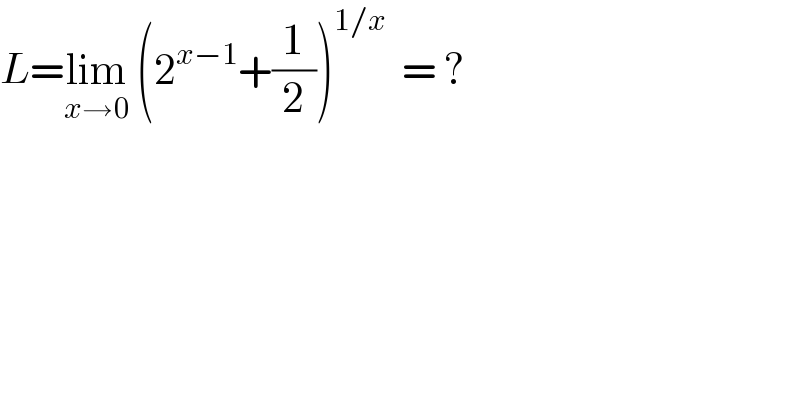Question Number 107550 by ajfour last updated on 11/Aug/20

$${L}=\underset{{x}\rightarrow\mathrm{0}} {\mathrm{lim}}\:\left(\mathrm{2}^{{x}−\mathrm{1}} +\frac{\mathrm{1}}{\mathrm{2}}\right)^{\mathrm{1}/{x}} \:\:=\:? \\ $$
Answered by hgrocks last updated on 11/Aug/20

Commented by ajfour last updated on 11/Aug/20

$${Good},\:{thanks}\:{Sir}. \\ $$
Answered by john santu last updated on 11/Aug/20

$$\:\:\:\:\:\:\:\:\:\divideontimes\mathcal{JS}\divideontimes \\ $$$$\mathcal{L}\:=\:\underset{{x}\rightarrow\mathrm{0}} {\mathrm{lim}}\left(\frac{\mathrm{1}}{\mathrm{2}}.\mathrm{2}^{{x}} +\frac{\mathrm{1}}{\mathrm{2}}\right)^{\frac{\mathrm{1}}{{x}}} \\ $$$$\mathcal{L}=\underset{{x}\rightarrow\mathrm{0}} {\mathrm{lim}}\left(\mathrm{2}^{{x}−\mathrm{1}} \:\left(\mathrm{1}+\frac{\mathrm{1}}{\mathrm{2}^{{x}} }\right)\right)^{\frac{\mathrm{1}}{{x}}} \\ $$$$\mathrm{ln}\:\mathcal{L}=\underset{{x}\rightarrow\mathrm{0}} {\mathrm{lim}}\frac{\mathrm{ln}\:\left(\mathrm{2}^{{x}−\mathrm{1}} \right)+\mathrm{ln}\:\left(\mathrm{1}+\mathrm{2}^{−{x}} \right)}{{x}} \\ $$$$\mathrm{ln}\:\mathcal{L}=\underset{{x}\rightarrow\mathrm{0}} {\mathrm{lim}}\frac{\mathrm{2}^{{x}−\mathrm{1}} \:\mathrm{ln}\:\left(\mathrm{2}\right)}{\mathrm{2}^{{x}−\mathrm{1}} }−\frac{\mathrm{2}^{−{x}} \:\mathrm{ln}\:\left(\mathrm{2}\right)}{\mathrm{1}+\mathrm{2}^{−{x}} } \\ $$$$\mathrm{ln}\:\mathcal{L}=\frac{\frac{\mathrm{1}}{\mathrm{2}}\mathrm{ln}\:\left(\mathrm{2}\right)}{\frac{\mathrm{1}}{\mathrm{2}}}−\frac{\mathrm{ln}\:\left(\mathrm{2}\right)}{\mathrm{2}}\:=\:\frac{\mathrm{1}}{\mathrm{2}}\mathrm{ln}\:\left(\mathrm{2}\right)=\mathrm{ln}\:\left(\sqrt{\mathrm{2}}\right) \\ $$$$\mathcal{L}=\:\sqrt{\mathrm{2}} \\ $$
Commented by ajfour last updated on 11/Aug/20

$${Thanks}\:{JS}\:,\:{but}\:{it}\:{seems}\:{bit}\:{cumbersome}, \\ $$$${dont}\:{mind}.. \\ $$
Commented by john santu last updated on 11/Aug/20
no problem. up to you
Answered by Dwaipayan Shikari last updated on 11/Aug/20

$$\underset{{x}\rightarrow\mathrm{0}} {\mathrm{lim}}\frac{\mathrm{1}}{{x}}{log}\left(\mathrm{1}+\mathrm{2}^{{x}−\mathrm{1}} −\frac{\mathrm{1}}{\mathrm{2}}\right)={logy} \\ $$$$\frac{\mathrm{1}}{{x}}.\left(\mathrm{2}^{{x}−\mathrm{1}} −\frac{\mathrm{1}}{\mathrm{2}}\right)={logy} \\ $$$$\frac{\mathrm{1}}{\mathrm{2}}.\frac{\mathrm{2}^{{x}} −\mathrm{1}}{{x}}={logy} \\ $$$$\frac{{log}\left(\mathrm{2}\right)}{\mathrm{2}}={logy} \\ $$$${y}=\sqrt{\mathrm{2}} \\ $$
Commented by ajfour last updated on 11/Aug/20

$${Quite}\:{nice},\:{thanks}! \\ $$
Answered by ajfour last updated on 11/Aug/20

$${L}=\underset{{x}\rightarrow\mathrm{0}} {\mathrm{lim}}\left(\mathrm{1}+\frac{\mathrm{2}^{{x}} −\mathrm{1}}{{x}}.\frac{{x}}{\mathrm{2}}\right)^{\mathrm{1}/{x}} \\ $$$$\:\:\:=\:\underset{{x}\rightarrow\mathrm{0}} {\mathrm{lim}}\left\{\left(\mathrm{1}+\frac{{x}}{\mathrm{2}}\mathrm{ln}\:\mathrm{2}\right)^{\frac{\mathrm{2}}{{x}\mathrm{ln}\:\mathrm{2}}} \right\}^{\frac{\mathrm{ln}\:\mathrm{2}}{\mathrm{2}}} \\ $$$$\:{L}\:={e}^{\mathrm{ln}\:\sqrt{\mathrm{2}}} \:=\:\sqrt{\mathrm{2}}\:. \\ $$
Answered by mathmax by abdo last updated on 11/Aug/20

$$\mathrm{f}\left(\mathrm{x}\right)=\left(\mathrm{2}^{\mathrm{x}−\mathrm{1}} \:+\frac{\mathrm{1}}{\mathrm{2}}\right)^{\frac{\mathrm{1}}{\mathrm{x}}} \:\Rightarrow\mathrm{f}\left(\mathrm{x}\right)\:=\mathrm{e}^{\frac{\mathrm{1}}{\mathrm{x}}\mathrm{ln}\left(\mathrm{2}^{\mathrm{x}−\mathrm{1}} \:+\frac{\mathrm{1}}{\mathrm{2}}\right)} \mathrm{we}\:\mathrm{have} \\ $$$$\mathrm{2}^{\mathrm{x}−\mathrm{1}} \:=\mathrm{e}^{\left(\mathrm{x}−\mathrm{1}\right)\mathrm{ln}\left(\mathrm{2}\right)} \:=\mathrm{e}^{−\mathrm{ln}\left(\mathrm{2}\right)} .\mathrm{e}^{\mathrm{xln}\left(\mathrm{2}\right)\:} \sim\mathrm{e}^{−\mathrm{ln}\left(\mathrm{2}\right)} \left\{\mathrm{1}+\mathrm{xln}\left(\mathrm{2}\right)\right\}=\frac{\mathrm{1}}{\mathrm{2}}\left(\mathrm{1}+\mathrm{xln}\left(\mathrm{2}\right)\right) \\ $$$$\Rightarrow\mathrm{2}^{\mathrm{x}−\mathrm{1}} \:+\frac{\mathrm{1}}{\mathrm{2}}\sim\mathrm{1}+\mathrm{x}\frac{\mathrm{ln}\left(\mathrm{2}\right)}{\mathrm{2}}\:\Rightarrow\mathrm{ln}\left(\mathrm{2}^{\mathrm{x}−\mathrm{1}} \:+\frac{\mathrm{1}}{\mathrm{2}}\right)\sim\mathrm{ln}\left(\mathrm{1}+\mathrm{xln}\left(\mathrm{2}\right)\right)\sim\frac{\mathrm{x}}{\mathrm{2}}\mathrm{ln}\left(\mathrm{2}\right)\:\Rightarrow \\ $$$$\frac{\mathrm{1}}{\mathrm{x}}\mathrm{ln}\left(\mathrm{2}^{\mathrm{x}−\mathrm{1}} \:+\frac{\mathrm{1}}{\mathrm{2}}\right)\sim\frac{\mathrm{1}}{\mathrm{2}}\mathrm{ln}\left(\mathrm{2}\right)\:=\mathrm{ln}\left(\sqrt{\mathrm{2}}\right)\:\Rightarrow\mathrm{lim}_{\mathrm{x}\rightarrow\mathrm{0}^{+} } \:\:\mathrm{f}\left(\mathrm{x}\right)\:=\sqrt{\mathrm{2}} \\ $$
